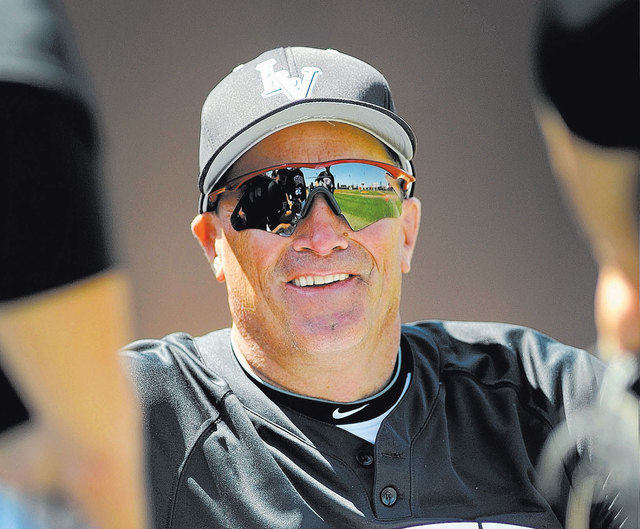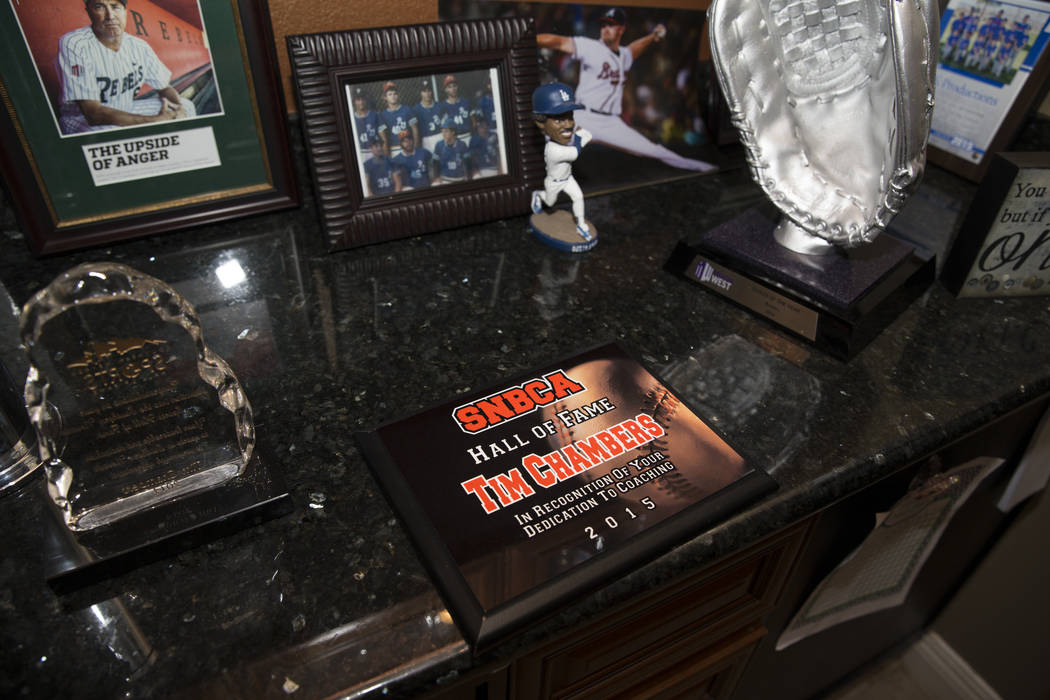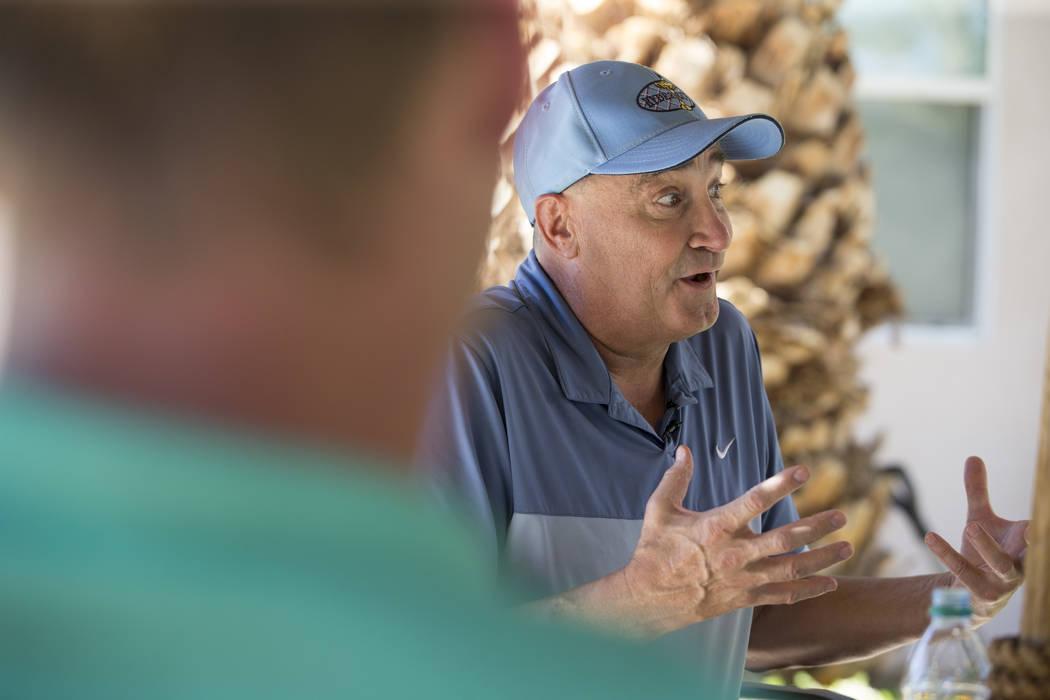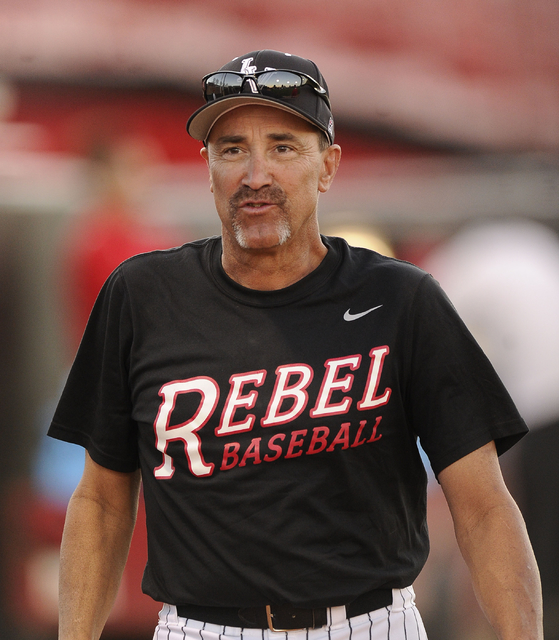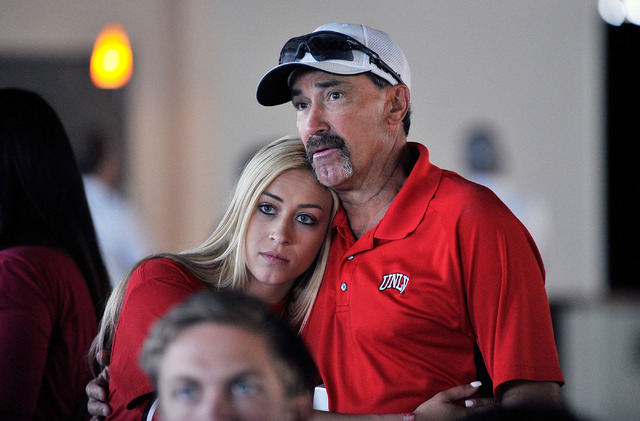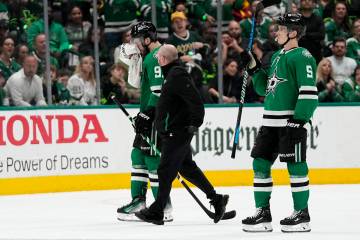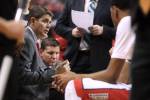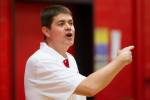Ex-baseball coach Tim Chambers talks UNLV firing amid drunken journey
They took him out the back door of Clark County Detention Center— his wife and high school baseball coach, the latter far more a father than the one who used to beat the hell out of him — to avoid any curious sorts toting cameras and notebooks.
Tim Chambers had spent the previous 12 hours incarcerated, arrested for driving under the influence after he fell asleep at the wheel on the Las Vegas Beltway near the McCarran International Airport connector tunnel and crashed his truck into sand-filled barrels.
“I knew walking out of jail that day, it was over,” he said of his October 2015 incarceration. “I knew it in my gut.”
The journey to this point, talking publicly for the first time since being fired as UNLV’s baseball coach in December 2015, struggling to overcome the mental and physical anguish of countless major surgeries, fighting to never again see the bottom of a whiskey bottle, is fueled by a different kind of addiction.
He wants to coach again.
He is fixated on it.
“I think he could survive literally if he didn’t, but it would kill him inside,” said Joey Swanner, who played for Chambers at UNLV. “It would drain him of all physical emotion. Hopefully, it never gets to that.”
Chambers regularly medicated himself with Crown Royal — straight, no ice, no chaser, no mixer, just a warm, smooth burn sliding down his throat — at a time when many still considered him baseball royalty in Las Vegas.
The king had a mighty fall, yet he understands this: It’s all his fault.
Legacy of winning
Chambers coached locally for nearly three decades, first at Bishop Gorman High School and then 11 seasons at the College of Southern Nevada, where he won a national title, was named national Coach of the Year and later tutored a future Major League Baseball MVP in Bryce Harper.
In 2010, Chambers landed the job many in town had pushed him toward for years: the UNLV program, which most believed had unlimited potential if run by a man with a profound knowledge of the game.
He reached 100 wins faster than any other Rebel coach and was named Mountain West Coach of the Year in 2014, when the Rebels captured the league’s regular-season title and advanced to the NCAA Regionals.
UNLV was on the path Chambers had promised to deliver. He made it into a winner.
Five years later, he was walking out the back of a jail.
While numbers defined his success on the field, others told a deeper reason why things went so horribly wrong: In all, Chambers has undergone more than 20 surgeries, including several on his spine.
During one 12-month stretch, he had eight major procedures, four on his back, and was put under anesthesia 18 times.
Twelve screws in right foot. Torn labrum and bicep tendon. Severed rotator cuff. Staph infection in his elbow. Right knee surgery. A broken right leg.
One back operation lasted nearly nine hours.
More than once, Kimberlie Chambers, his wife of 28 years, was told by doctors it could be the time he didn’t wake up.
And each time he did, he went back to drinking.
When he wasn’t taking an indefinite medical leave of absence from the Rebels, Chambers was coaching in severe pain, to the point he could barely walk. Always, he sought medication beyond those pain killers Chambers insists didn’t soothe his suffering. Games would end and he would slowly limp his way to the clubhouse, where a bottle awaited in his locker.
“One surgery led to another and then another and then depression set in and then more alcohol,” he said. “It was more about just me being a drunk.
“I’ll never make an excuse for what I did. I’m an alcoholic. I own every bit if it. No one is to blame but me. I take full responsibility. My entire career, all the time, all I told my players was, ‘Don’t get behind the wheel. Have someone drive you.’ And then I go and do it. That hurts me the most, the thought that I let them down.
“But I coached in this town 30 years and now some people who always supported me act like I’m a (bleeping) stranger. Are you kidding me?”
Not everyone.
Standing by his skipper
The jewel of UNLV baseball is a 10,000-square foot clubhouse that opened in 2016, the sort of bells-and-whistles structure that can entice recruits who wouldn’t otherwise consider a non-Power 5 Conference program.
It is named for Anthony and Lyndy Marnell, whose $2.75 million gift led to its raising.
The family who, through all the pain and drinking and mishaps of Tim Chambers, never quit on him.
It was Anthony Marnell, along with a few others who included former UNLV athletic director Jim Livengood, who helped place Chambers in a rehab center in Tucson, Arizona; it was Marnell who flew the coach to Santa Barbara, California, to be treated by a back specialist after initial surgeries went terribly wrong.
The clubhouse was built for UNLV players now and for generations to come, but know this: Had the head coach at the time of ground breaking not been Chambers, dirt would have never been moved, at least not with the financial backing of the Marnells.
A clubhouse that, to this day, Chambers has never entered.
“We don’t get nine lives and Tim knows that,” said Anthony Marnell, who played for Chambers at Bishop Gorman in the early 1990s. “He made a lot of big mistakes, but he never gave up on anyone and I will never give up on him.
“I defy anyone to name a person who sent more kids to college in this town than Tim Chambers, who helped more kids realize their dreams instead of them dropping out of school and quitting baseball and taking different paths in life. I live by a motto of not leaving people behind, and there was no way I was leaving Tim behind.”
One facet, more than any, more than losing his job or entering rehab twice for alcoholism or the agony from all the surgeries, brings tears to Chambers. His players.
He can’t speak about them now in any depth without crying, a man who watched just as many become doctors and lawyers and vice presidents of major companies as he did those who went on to play professionally.
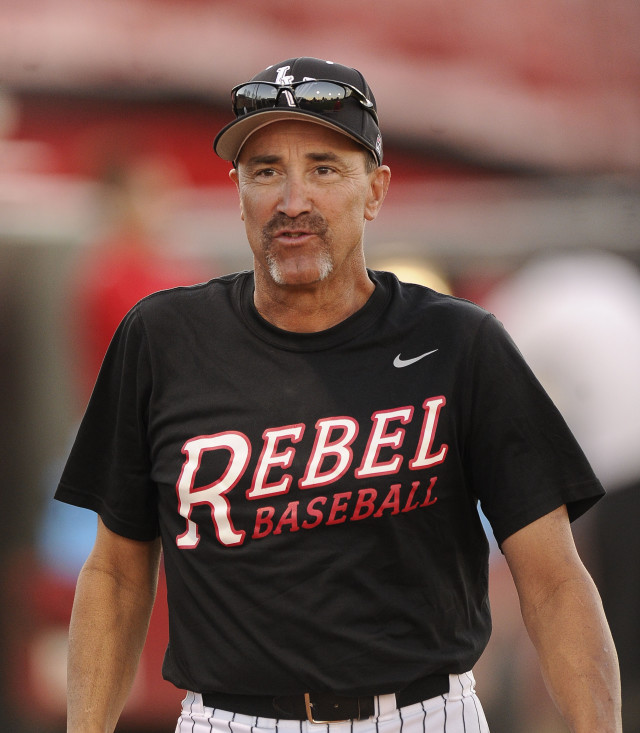
Tim Chambers, UNLV baseball coach (Las Vegas Review-Journal)
“I remember the day I got called up to the majors,” said former CSN pitcher Chasen Shreve, in his fourth season with the Yankees after being drafted by the Braves in 2011. “Chambers left me a voice message. He was crying, saying how proud he was of me, how happy he was for me. He’s the best coach I ever played for. I love him. I’d play for him again right now if I could. It’s sad what happened, of course, but I’ve never been around a guy who cares more about his players.”
Said Mike Dunn, a pitcher for the Rockies whose jersey was retired by CSN in 2011 on the same day as Harper and, yes, his former coach: “I think Chambers was at a place in life where he needed that crash to happen to wake him up. He wasn’t going to listen to anybody. But he was always there for us, so we needed to be there for him, give him some tough love and let him know how much we cared and that he needed to get help. I text him all the time that I love him. It has always been more about baseball for him when it came to those he coached.”
To hell and back
This was a rule of the house: When you were lined up against the wall for whatever misdeed had been committed in the old man’s eyes, you had to stand straight. If you bent your legs even an inch, you would get a crack across both of them.
Or maybe a steel skillet to the gut, which his mother got when she was pregnant with Tim’s little sister.
Chambers, even at 4 years old, owned athletic genes. He could stand straight all day and then some, but older brother Anthony couldn’t, so he got whacked over and over. Every once in a while, Tim would bend his knees on purpose and take the punishment, so as to save his brother a worse beating.
When the father who extended such abuse died, a then-adult Chambers demanded the coffin be opened at the memorial service. They cleared the room and inside lay his father, a piece of chocolate cake on his chest and a pack of cigarettes and lighter stuck in his shirt pocket.
His father was 52.
“I just had to make sure the son-of-a-bitch was really dead,” Chambers said. “Once I knew, I told them to close it up and I was good.”
Tim Chambers is 52.
Steinbeck wrote that a journey is a person in itself, that we find after years of struggle, we do not take a trip; a trip takes us. Transformation, then, is a process, and the mental and physical scars and bad choices born from the bottom of both a whiskey bottle and that of pain killers took Chambers on his own voyage to hell and back.
There are alcoholics spread across both sides of his family, but it wasn’t until that day he walked out of jail when his coach, Jon Hoover, the man he considers his real father, looked him in the eye and said enough was finally enough.
The ironic part is, Chambers wasn’t drunk the morning he swerved into an adjacent lane and struck another car (thankfully not injuring anyone) before veering into the left dirt shoulder and striking multiple sand-filled crash barrels.
He had drank some the night before, but was instead driving under the influence of Ativan, a benzodiazepine used to treat anxiety that causes sleep before surgery.
He would eventually plead no contest to DUI charges, complete court-mandated classes and the case was terminated.
“He made a decision to accept full responsibility,” said William Terry, Chambers attorney.
But even time in the Tucson rehabilitation center couldn’t save his job.
Chambers resigned about as much as former UNLV basketball coach Dave Rice did. He was, like Rice, fired, but agreed to a statement of resignation. The last thing Chambers or Rice would do is voluntarily walk away from players. It would never happen.
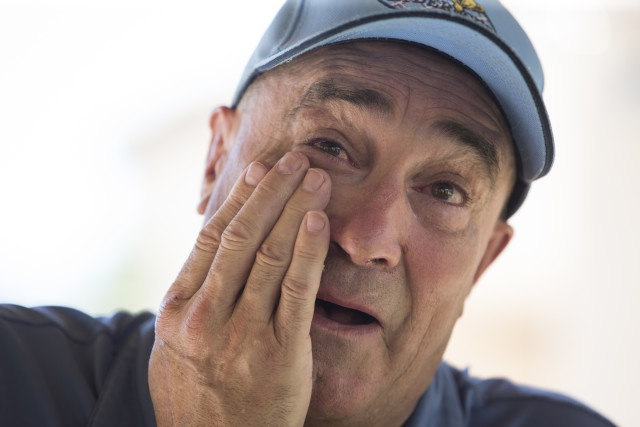
Tim Chambers tears up during an interview.
(Las Vegas Review-Journal)
Terry says UNLV fired Chambers before there was even an arraignment on the DUI case. The coach was called into a meeting after returning from Tucson in December of 2015 and told by university officials they were taking the program in a different direction.
That part hasn’t gone very well on the scoreboard.
UNLV baseball is, the last two seasons, 44-68 overall and 24-36 in the Mountain West under head coach Stan Stolte. The Rebels are struggling unlike at any time when Chambers was running the program on a full-time basis.
The stay in a Tucson rehab center was followed by another locally, and Chambers is now working a 12-step program through his bishop in The Church of Jesus Christ of Latter-day Saints. His weight, once as low as 150 pounds at his worst point, is back to his normal 185.
He said this is the healthiest he has been in seven years, and he definitely looks the part.
His new number: 160 days sober.
Leaving Las Vegas
Chambers now chases the one thing he wants more than anything in life beyond his sobriety, and accepts it probably no longer exists here.
He has fielded some calls of interest about coaching college again and, 30 years later, knows that will mean moving from Las Vegas, from his wife’s dream home, from where daughters McKenzie, 23, and Chase, 10, were born and raised, from the town in which he was once baseball royalty.
The family members that that witnessed his darkest moments, that stood by him during that journey to hell and back, that knows how deeply he misses the game, the players, the beauty of it all, are ready to follow him.
One thing Chambers wouldn’t discuss was those in UNLV athletics who fired him, saying his speaking now is only about doing what is necessary to become healthy again, to become whole again, to own his past.
“I wake up every morning and say, ‘Today, I’m not going to drink,’” Chambers said. “It’s not, ‘I’m never drinking again.’ One day at a time. God saved my life with that crash. I will never say that I wish it hadn’t happened.
“I might have a house, but the baseball field is my home. I only know how to do one thing. I can’t build a bridge or dig a ditch or write this story. Baseball is my savior. A really hard day for me is not having anything to do. I have to stay busy. I need to be coaching.
“God put me on this earth to change young lives. I know that for sure. I can’t do that sitting in a recliner watching golf. I’m going to coach again. I know that — 100 percent. I’ll go to the University of Wherever. I don’t care. I miss the kids so much. I miss the relationships, the camaraderie.
“It’s where, more than anywhere, I fit.
“It’s where, more than anything else in life, I find peace.”
Contact columnist Ed Graney at egraney@reviewjournal.com or 702-383-4618. He can be heard on ESPN Radio 100.9 FM and 1100 AM from 11 a.m. to 2 p.m. Monday through Friday. Follow @edgraney on Twitter.




